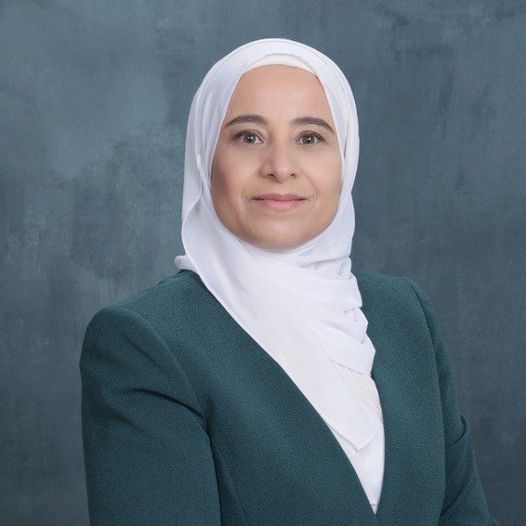
Dr. Hanan Almasri is the principal of the Islamic Academy of North Texas (IANT) Quranic
Academy, Richardson.
By Islamic Horizons Staff
November/December
Muslim students in New York’s Brentwood district are being served halal food in school cafeterias starting this school year in September. The Brentwood Union Free School District unanimously passed a resolution on July 20 to offer halal food in the district’s 19 cafeterias.
Trustee Hassan Ahmed, the first Muslim and Pakistani-American official elected in Suffolk County, introduced the resolution to include halal dietary options. He estimates that 1,000+ Muslim families live in the district, which has two mosques.
The Atlantic City (N.J.) school district began serving halal food at several elementary schools and the high school during March 2021.
The San Francisco Unified School District’s (SFUSD) school board voted on Aug. 6 to recognize Eid al-Fitr and Eid al-Adha as official holidays and close schools and administrative offices on those days beginning in the 2023-24 school year.
If the holidays fall on a weekend, school will not be in session either the day before or after.
A 2013 demographic study estimated that about 250,000 Muslims live in the Bay Area, of which about 3% live in San Francisco. The study, commissioned by the One Nation Bay Area Project, said the city’s Tenderloin neighborhood in particular had concentrations of Yemeni, Iraqi, Moroccan, Algerian, Indonesian and Malaysian Muslims.
San Francisco’s Arab Resource and Organizing Center celebrated the decision. Executive Director Lara Kiswani proclaimed: “This resolution demonstrates that racial justice is not just a value. But something that must be an everyday priority and practice in San Francisco Unified School District.”
Supporters of the resolution say it will make Muslim students feel more included in public schools and prevent them from missing important school deadlines because of their religious observance. The measure also “foster[s] an environment of diversity and tolerance,” according to the resolution’s text.
Board members Kevine Boggess, Jenny Lam, Matt Alexander and Lisa Weissman-Ward voted in favor of the measure; Ann Hsu voted against it.
Omar Farah assumed his post as executive director of Muslim Advocates during August. In his previous position — senior staff attorney and associate director of strategic initiatives at the Center for Constitutional Rights (CCR), a cutting-edge national legal advocacy organization — he worked on some of the most trenchant challenges facing Muslim American communities today: litigating against post-9/11 abuses of power by representing Muslims detained at Guantánamo Bay and building institutional bulwarks against white nationalism and institutional racism by helping establish and expand CCR’s presence in the South.
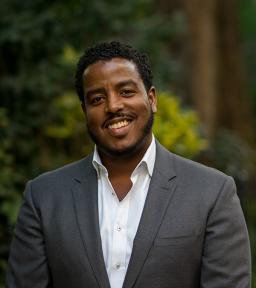
A graduate of Columbia University and Georgetown University Law School, Farah had partnered with Muslim Advocates on the landmark lawsuit that helped shut down the NYPD’s unconstitutional surveillance program targeting New Jersey’s Muslims.
The first-ever Indiana Educational Excellence Awards, held on Sept. 9, recognized Eman Schools of Fishers, Ind., with its Excellence in Early Literacy award. It comes with a $170,000 award grant.
This award focuses on ensuring that all students demonstrate proficiency in foundational reading skills by recognizing a school corporation (Tri-Township) that has achieved a 100% districtwide passing rate on the 2022 IREAD-3 assessment. It also recognizes large and small elementary schools that have achieved the highest schoolwide IREAD-3 pass rate percentage, along with the highest pass rate across all student populations.
Dr. Katie Jenner, the state’s education secretary, said, “Indiana’s first-ever Educational Excellence Awards Gala brought together some of our most impactful educators and school leaders, whose daily work is helping countless students to ignite their own purpose, know their value and understand the possibilities for their life’s path. We know that real impact for students happens at the educator-level, and our team remains dedicated to supporting educators and amplifying their good work.”
Grants must be used to sustain and expand the school’s current impactful programming, support teachers who lead this work, as well as mentor other schools to drive additional innovative strategies through a community of practice.
Voting 5-0-1 on Aug. 23, the Anaheim City Council fulfilled an at least two-decades-long demand by officially recognizing an area of Brookhurst Street as Little Arabia — its nickname for years.
Perhaps the nation’s first formal Arab American cultural district, its leaders, business owners and community members had been calling upon councilmembers to bestow this designation.

Rashad Al-Dabbagh (founder, Arab American Civic Council), who spearheaded the push for years, believes that this move will help uplift their small businesses, support the immigrant families and honor this community.
According to the OC Weekly (2012), by the 1980s white flight had left the area mostly abandoned or replaced with seedy businesses.
Little Arabia, which grew significantly in the 1990s due to the arrival of Arab immigrants, is now home to thousands of Arab-Americans hailing predominantly from Egypt, Syria, Lebanon and Palestine. Local business leaders began buying distressed homes and selling them to these immigrants. They also bought plazas and office buildings, as well as recruited merchants to start up new businesses in West Anaheim.
During his 2014 State of the City address, an event held at the time by the Anaheim Chamber of Commerce, Anaheim mayor Tom Tait encouraged the 600+ attendees to visit the district and dine at authentic Arabic restaurants.
A study, which is expected to take 6-9 months to complete, could potentially lead to the expansion of Little Arabia’s boundaries.
Little Arabia residents believe that it will not only acknowledge their contributions to the city and make them feel appreciated, but also help bring in more business.
Troy, Mich. inaugurated its first mosque, the Adam Community Center, on Sept. 17, with Mayor Ethan Baker, Shaykh Muhammad Al-Masmari (imam and khatib, Muslim Unity Center, Bloomfield Hills, Mich.), Shaykh Mustapha Elturk (ameer, the Islamic Organization of North America) and Dawud Walid (executive director, CAIR-MI).
Until now, the large ethnically and religiously diverse Metro Detroit city of 80,000+ residents had churches, temples and a synagogue but no mosque, despite its large and recognized Muslim population.
The building is a former restaurant already zoned for assembly use. However, the city refused to provide the Center with a variance to allow it to be used for religious use.
The refusal resulted in two lawsuits filed in U.S. District Court in Detroit: one by the U.S. Department of Justice in 2019 that claimed discrimination in the city’s zoning, and another filed by the Center itself. The Justice Department supports the mosque’s argument to be treated equally, and the court ruled in its favor during March. In the Center’s lawsuit, a judge ordered the two sides to work together to establish the city’s first mosque.
The mosque was legally represented by the Michigan chapter of the Council on American Islamic Relations (CAIR-MI). “Litigation, however, is still pending regarding the City Council’s refusal to pay damages to the community for legal fees and violating its civil rights,” CAIR-MI said. The mosque is asking for $1.9 million.
The building housing the mosque is roughly 21,000 sq. ft. in size, with a 11,000 sq. ft. prayer area. The parking lot accommodates some 155 cars. The project has already cost more than $3 million.
Muslims on Pittsburgh’s North Side broke ground for their Light of the Age Mosque — the city’s first mosque to be built from the ground up — on Aug. 24. They have spent the last two decades praying in a rented building near Allegheny General Hospital.
A large portion of the mosque’s funding comes from the late Anisa I. Kanbour, a local physician and longtime supporter of Pittsburgh’s Muslim community who willed $1.5 million to establish the building in the city’s limits. Ever since the 1970s, her brother Fouad Kanbour told the gathering, she had wanted to build a mosque in Pittsburgh.
Imam Hamza Perez, a co-founder of the mosque, told the Pittsburgh Post-Gazette on Aug. 24 that he had a dream before receiving the funding, in which he came upon a mosque where all the doors except one were locked.
The Manchester Citizens Corporation, a neighborhood group, and its executive director LaShawn Burton-Faulk also helped bring the mosque into the neighborhood.
The late Iraq-born physician (Baghdad Medical College ‘57) endowed The Anisa I. Kanbour School of Cytopathology/University Health Center of Pittsburgh at Magee Women’s Hospital, Pittsburgh — one of the oldest cytotechnology schools in the country — and also made the transformational gift to establish The Kanbour Chair of Gynecology.
To advance continued research and scholarly work in the field of gynecology, Dr. Anisa I. Kanbour, a distinguished pathologist and former Medical Director of the Anisa I. Kanbour School of Cytology, made a transformational gift to establish The Kanbour Chair of Gynecology. This generous endowment will provide a continuous stream of income to support gynecological research, specifically in the lower genital tract.
Kanbor graduated from Baghdad Medical College in 1957 and practiced obstetrics and gynecology for several years in Iraq. During a 1964 trip to the U.S. to visit family, she applied for — and received — a scholarship that enabled her to attend the University of Pennsylvania’s Graduate School of Medicine. She completed a pathology residency at Philadelphia General Hospital and came to Magee-Women’s Hospital in 1969 for a gynecologic pathology fellowship. She remained there until her retirement in January 2013. Over the years, she established herself as an expert in the field of pathology and cytology.
Imam Shane Atkinson (associate chaplain for Muslim life, Elon University) has been awarded a grant from the “Islam on the Edges” program by Shenandoah University’s Center for Islam in the Contemporary World. The grant will help fund research on the diverse facets of Islam and the Muslim community, including geography, doctrine, culture, language, history and civilizations.
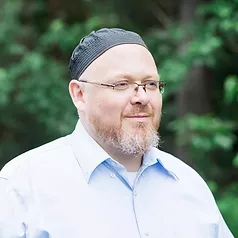
Atkinson’s project, “Where the Mountains Meet: The Devotional Arts of Sacred Harp and Sufi Dhikr,” will focus on the overlap between “sacred harp,” a style of Appalachian gospel music, and the Sufi chants of the Qadiri Sufi order of the Caucasus. He will explore the unique characteristics and shared traits of these vocal and spiritual worship forms while promoting their preservation and modern reconfiguration through a self-composed piece utilizing elements of both styles.
Atkinson, born to a Mississippi Southern Baptist family, feels that this project is a natural expression of what it means to be a Muslim from the Deep South and is honored and excited to be chosen for the grant.
“It’s very encouraging that the broader society is having a more nuanced understanding of who Muslims are,” Atkinson said. “We are not a monolith.”
In addition to his research and work at Elon, Atkinson has been featured in the Harvard University Pluralism Project and starred in the documentary “Redneck Muslim,” directed by Jennifer Taylor. The film shares Atkinson’s story as a convert while staying true to his southern identity and combatting white supremacy.
ACHIEVERS
Salma Hussein (MSW, University of Minnesota ’13, Ed.D., Hamline Univ., ’24, LICSW), a K-12 school administrator who has called Minnesota home since migrating from Somalia in 1996, was appointed principal at Gideon Pond Elementary in The Burnsville-Eagan-Savage school district.
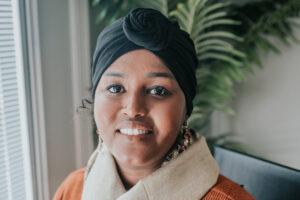
The 2021 Bush Fellowship recipient, who is pursuing her educational doctorate, also served as board member of The Confederation of Somali Community in Minnesota (2015–18) and is the state’s first Somali female principal.
Hussein says, “I had no intention of becoming Minnesota’s first Somali female principal, let alone making history. I am called to educate and foster the minds and hearts of our young people. The work continues to facilitate love and strength-based systems change. With love, everything is better.”
In high school, she and her sister Fatima founded Girls Initiative in Recreation and Leisurely Sport (GIRLS), a nonprofit organization that has blossomed into a cross-cultural community and safe space for women and girls to exercise and play sports.
Shaykha Ieasha Prime (resident scholar and curriculum director, Islamic Society of Baltimore) is a renowned speaker and educator who has received several scholarly licenses (ijaza). She studied Arabic and Quran at Cairo’s Fajr Institute and then moved to Hadramawt, Yemen, where she studied aqeedah, the Quran, Hadith, Arabic, fiqh and Islamic law, along with “Purification of the Heart” and more at Dar al-Zahra, an Islamic university for women.

A convert for 20+ years, she has spent most of her life as an educator and activist. In addition to being a wife and the mother of three children, Prime been involved in the founding and leadership of numerous Islamic organizations. She remains passionate about the courses she teaches on traditional knowledge, the challenges of race and gender in the Muslim community, as well as spirituality.
The 2023 AARP Purpose Prize winners include Zerqa Abid, founder and executive director of MY Project USA (Columbus, Ohio), which protects youth from drugs, gangs and human trafficking by empowering them through sports, social services and civic engagement.
The awards ceremony was held Oct. 25 in Washington, D.C. The annual prize is given to five individuals, aged 50 and over, who are using their knowledge and life experience to solve challenging social problems.
Abid said, “This national recognition of the impact made by MY Project USA in Central Ohio in just seven years means a lot to me personally.”
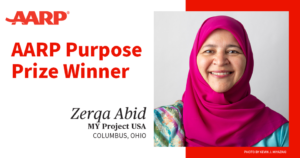
“We celebrate these inspiring individuals who have used their decades of life experience to give back in a meaningful way, to be leaders in their communities and to create a better future for us all,” added AARP CEO Jo Ann Jenkins.
Each winner received $50,000 for their nonprofit organizations. The AARP Inspire Award provides an additional $10,000 to the organization of a Purpose Prize winner based on the public’s vote.
Dr. Berthena Nabaa-McKinney (D), the first Muslim elected to the board, was sworn in on Aug. 31 to represent District 4 on the Metro Nashville (Tenn.) Board of Education.
In 2020, the Metro Council appointed this former MNPS teacher fill the gap left by the death of Chair Anna Shepherd. On Aug.4, she was elected for the first time.
Nabaa-McKinney owns Nabaa Consulting, LLC, an educational consulting firm specializing in school improvement for Early Learning and K-12 schools.
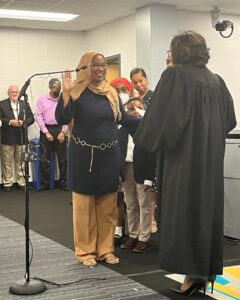
Prior to her consultant role, Nabaa-McKinney was the principal at Nashville International Academy and led the school through its restructuring effort to achieve its first-time accreditation. She also led and served on school and district accreditation teams across the state.
During her time at MNPS, Nabaa-McKinney worked at Antioch and Cane Ridge high schools in various roles, including chemistry teacher, science department chair, freshman academy lead and ACT coordinator. Until her recent appointment, she was a commissioner on the Metro Action Commission. Currently, she sits on the boards of the ACLU-TN, PENCIL and Muslim American Cultural Center. She is an alumnus of L’Evate, formerly Leadership Donelson-Hermitage, Class of 2016, and a former co-chair of their youth leadership program, YELL.
Azmat Khan, a Pulitzer Center board member, was honored with the 2022 Catalyst Award on Oct. 11 by the Reporters Committee for Freedom of the Press. According to the Reporters Committee, Khan’s “investigations for The New York Times Magazine, the PBS series FRONTLINE, and BuzzFeed’s investigations team have exposed major myths of war, prompting widespread policy impact from Washington to Kabul, and winning nearly a dozen awards.”
Khan and her New York Times team won the 2022 Pulitzer Prize for International Reporting for their Civilian Casualty Files, an investigation into civilian deaths resulting from U.S. airstrikes in the Middle East. Khan was named to the Pulitzer Center board earlier this year.
ADAMS’ Tahfeedh ul Quran Program (Sterling, Va. branch) announced that Hafidh Imran Boufalla, 12, son of Said Boufalla and Aicha Abdellaoui, completed his hifdh program, which he started his journey in September 2019 and finished it in May of this year. Also, Hafidh Ashaj Hossain, 14, son Syed and Mumtahina Hossain, completed his hifdh journey on Aug. 22, which he had started in Sept. 2017.
Dr. Hanan Almasri took charge as principal of the Islamic Academy of North Texas (IANT) Quranic Academy, Richardson.
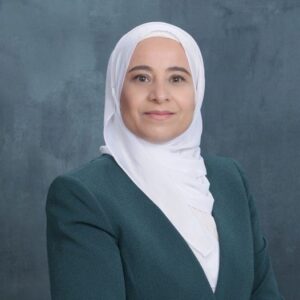
With 25+ years of experience in the educational field, Almasri has served in various roles, among them a K-12 Quran, Islamic studies, and Arabic teacher; an elementary school teacher; a high school academic counselor a secondary dean of academics; and a middle and high school principal.
She holds a master’s and doctoral degree in educational leadership and policy studies. Her research focuses on improving the retention of highly qualified teachers in Islamic schools, thereby improving the quality of education for student population. She defended her dissertation, “The High Cost of Leaving: Veteran Teacher Retention in Islamic Schools,” during 2022.
She additionally maintains several educator certificates, including Texas Principal Certification: Early Childhood–High School, Early Childhood–6th Grade General Education Certification, Early Childhood–High School ESL Certification and Early Childhood Special Education Certification. She has a bachelor’s degree in interdisciplinary studies in PK–6 education.
Tahir Ghani was named 2022 Inventor of the Year at Intel, where he is senior fellow and director of process pathfinding in the Technology Development Group.
In his 28-year career at Intel, Ghani, often called “Mr. Transistor,” has filed more than 1,000 patents and led teams responsible for some of the most revolutionary changes in transistors. An Aug. 17 Intel handout stated that innovations from his teams include strained silicon, High-K metal gate, FinFet transistors and, most recently, RibbonFET transistors. It added that his contribution to semiconductor technology has been enormous.
Prof. Syed Eqbal Hasan was invited by the University of Missouri-Kansas City’s Department of Earth & Environmental Sciences to teach a course in waste management during the fall semester, which began in August. This call came one week after John Wiley & Sons published his new college textbook, “Introduction to Waste Management” (August 2022). This is his second textbook in the field of environmental science.
His first book, “Geology and Hazardous Waste Management” (Prentice-Hall, 1996), was used as a textbook at many U.S. and overseas universities and received the Association of Environmental and Engineering Geologists’ prestigious Holdredge Award in 1998.
Hasan (professor emeritus, environmental geology, University of Missouri-Kansas City) is a two-time recipient of the Fulbright Senior Scholar Award (2016, Qatar University; 2020, University of Jordan) and the only environmental — as well as Muslim — scientist in the world who has singly authored two college textbooks in this field of waste management.
Muhammad (“Mo”) Arsalan Haq, a Pakistani-American entrepreneur in Kansas City, who has extensive experience in the restaurants’ management, joined the AMC Theatres as the vice president, food and beverage.
AMC Theaters is the largest movie exhibition company in the world with approximately 1,000 theaters and more than 11,000 screens across the globe serving nearly 350 million guests annually.
Tell us what you thought by joining our Facebook community. You can also send comments and story pitches to [email protected]. Islamic Horizons does not publish unsolicited material.
